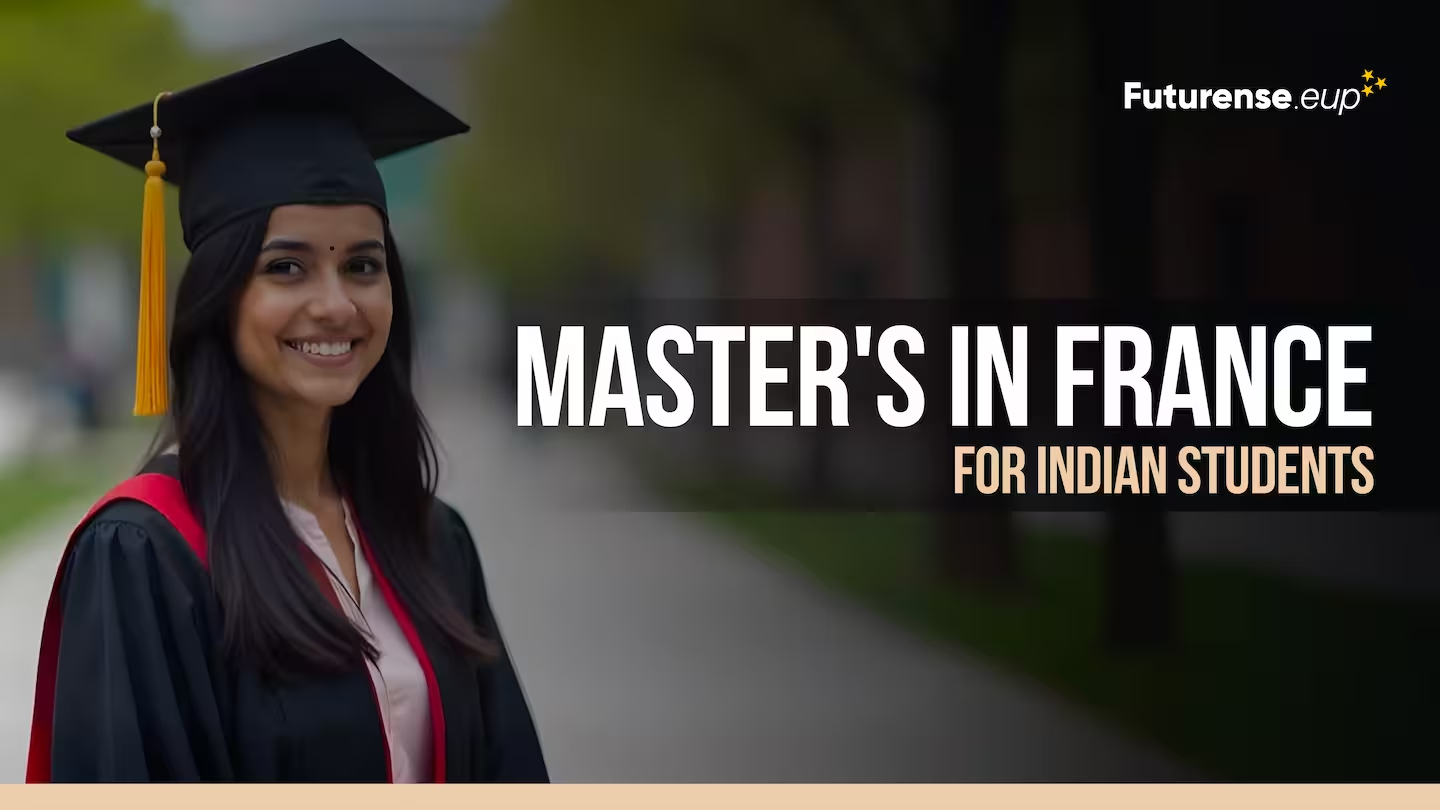Master's in France for Indian Students is becoming an increasingly popular choice due to the country’s world-class education system, diverse course offerings, and affordable tuition. France stands out as a top destination for a masters degree in France for international students, offering a wide range of programs in fields like computer science, business management, and engineering. Indian students can choose from English-taught or bilingual (English and French) master’s programs across public universities and prestigious grandes écoles. Tuition fees are highly competitive—starting at just €243 per year in public institutions and going up to €20,000+ in private schools. Financial support, including the Eiffel Excellence and Charpak Scholarships, helps ease the financial burden. With a strong emphasis on research, innovation, and industry partnerships, France also offers robust opportunities for internships and future employment. This guide will walk you through everything—from the application and visa process to student life and post-study work options.

Why Study MS in France? A Complete Guide to Master's in France for Indian Students
Excellence in Higher Education and Research
France is home to renowned French universities and grandes écoles known for their rigorous academic standards and emphasis on research and innovation. Institutions like École Polytechnique, HEC Paris, and Sorbonne University feature among global rankings for STEM and business programs. The country’s strong ties between academia and industry enable master students to access cutting-edge research labs, funded projects, and internship opportunities with leading companies.
Wide Range of Master Programs
Whether you’re passionate about computer science, data analytics, biotechnology, or international business, France offers a master program tailored to your goals. Public universities provide diverse master programs in English and French, while business schools and engineering grandes écoles offer specialized tracks in English language, including joint degrees and dual diplomas. From sustainable energy engineering to digital transformation, you can choose from a wide range of disciplines.
International Student Community
With over 300,000 international students in 2023, France fosters a multicultural environment that eases the transition for Indian students. Campus associations, Indian student societies, and language tandem programs help newcomers integrate socially and academically.
Types of Institutions and Programs
Public Universities
Public universities in France are heavily subsidized by the French government, resulting in some of the lowest tuition fees in Europe. For academic year 2024/25, non-EU master’s students pay around €250 per year at most public universities, while engineering schools charge up to €618 per year. Popular universities for Indian students include University of Paris, University of Strasbourg, and University of Lorraine.
Grandes Écoles
Grandes écoles are highly selective institutions offering specialized master programs in engineering, management, and public administration. Tuition fees at Grandes écoles range from €8,000 to €20,000 per year (INR 7–18 Lakh), reflecting their prestigious status and strong industry connections studapart.com.
Business Schools
Top French business schools such as HEC Paris, INSEAD, and ESCP Business School provide master programs in management, finance, and luxury brand management, often in English and French. Tuition fees at private business schools range from €15,000 to €47,000 per year, depending on the program level and institution.
Admission Process for Indian Students
Eligibility and Academic Requirements
- Bachelor’s Degree: A relevant undergraduate degree with at least 55% marks or equivalent GPA is generally required; top programs may ask for 60–65%.
- Language Proficiency: For English-taught master programs, IELTS (6.5+ overall) or TOEFL (85+) scores are typically required. For bilingual or French-taught tracks, B2 level French certification (DELF/DALF) may be necessary.
- Standardized Tests: Some business schools ask for GMAT/GRE scores, while engineering schools often waive these for strong academic records.
Application Timeline
- September–November (Year 1): Research programs, prepare documents (transcripts, CV, SOP, LORs).
- December–January (Year 1/2): Submit applications via university portals or the national platform Études en France.
- February–April (Year 2): Attend interviews or entrance exams (if applicable).
- May–June (Year 2): Receive admission decisions and apply for a visa.
Visa and Pre-Departure
Upon receiving an acceptance letter, apply for a long-stay student visa (VLS-TS) at the French Consulate/Embassy in India. Required documents include proof of admission, financial means (€615/month), health insurance, and accommodation details.
Tuition Fees and Financial Aid
Tuition Fees Overview
- Public Universities: €243–€380 per year (INR 20,000–30,000) for master’s programs studapart.com.
- Engineering Schools: €3,770 per year for non-exempted international students (up to INR 3.1 Lakh).
- Grandes Écoles: €8,000–€20,000 per year (INR 7–18 Lakh).
- Business Schools: €15,000–€47,000 per year (INR 12–39 Lakh).
Scholarships and Funding
- Eiffel Excellence Scholarship: Managed by the French Ministry of Foreign Affairs for top international master and PhD candidates, covering tuition, monthly stipend, and return trip.
- Charpak Scholarship: Offered by Campus France India, includes tuition waiver, living allowance, and visa fee exemption.
- Erasmus+ Program: European Union funding for joint master programs across Europe; covers tuition and living costs.
Life in France
Cost of Living
Average monthly expenses (excluding tuition) range between €800 and €1,200, covering accommodation, food, transport, and leisure. Student residence halls managed by CROUS offer subsidized rent (€200–€400/month).
Part-Time Work and Internships
Indian students can work up to 964 hours per year (20 hours/week) on a student visa, helping cover living costs and gain professional experience. Most master programs include mandatory internships, facilitating industry exposure.
Cultural Integration
French universities organize language tandem programs, buddy systems, and cultural events to help international students learn French and connect with peers. Major cities like Paris, Lyon, and Toulouse host vibrant Indian communities, with regular festivals such as Diwali and Holi celebrations.
Research and Innovation Opportunities
France excels in R&D, ranking 3rd in Europe for research output. Master students in computer science, biotechnology, and environmental engineering can collaborate on projects funded by CNRS, INSERM, and aerospace firms like Airbus Campus France. Research-driven learning ensures students graduate with both theoretical knowledge and practical skills.
Conclusion
Master's in France for Indian Students presents an exceptional opportunity to access world-class education, cutting-edge research, and vibrant cultural experiences. Renowned for its affordable public universities and elite grandes écoles, France offers a wide range of programs tailored to diverse academic and professional goals. For those seeking a master’s degree in France for international students, the country provides competitive tuition rates, extensive scholarship options such as the Eiffel Excellence and Charpak scholarships, and ample chances for internships and part-time work—making it both a smart and enriching choice.
FAQs
What are the eligibility requirements to do a Masters in France?
You need a relevant bachelor’s degree (often with minimum ~50-55% or equivalent) and proof of language proficiency—English (IELTS, TOEFL, etc.) for English-taught courses or French (DELF, DALF) for French-taught ones.
Do I need to go through Études en France / Campus France to study in France for Indian students?
Yes. Indian students must use the Études en France (Campus France) procedure (upload documents, select programs, get a No Objection Certificate) as part of admissions.
Can I study a Masters in France without IELTS?
Sometimes some universities waive IELTS if your previous degree was in English or accept alternate English tests. However, many still require proof of English (or French) proficiency.
What scholarships are available for Indian students doing Masters in France?
Major scholarships include Eiffel Excellence Scholarship, Charpak (France Excellence Charpak), Erasmus+ joint master scholarships, and university-specific grants.
What are post-study opportunities / work visas after completing a Masters in France?
Graduates can apply for Autorisation Provisoire de Séjour (APS) — up to 24 months to find a job or start a business. After that, with a qualifying job, they may transition to a work permit or “Talent Passport.”







.avif)
.avif)
.avif)